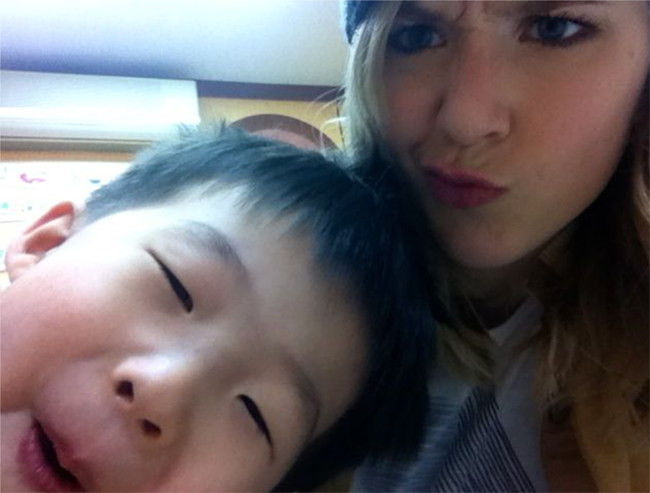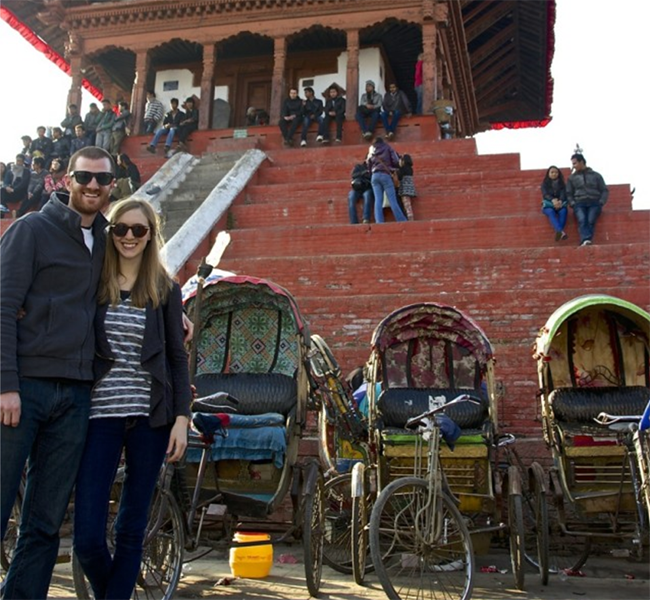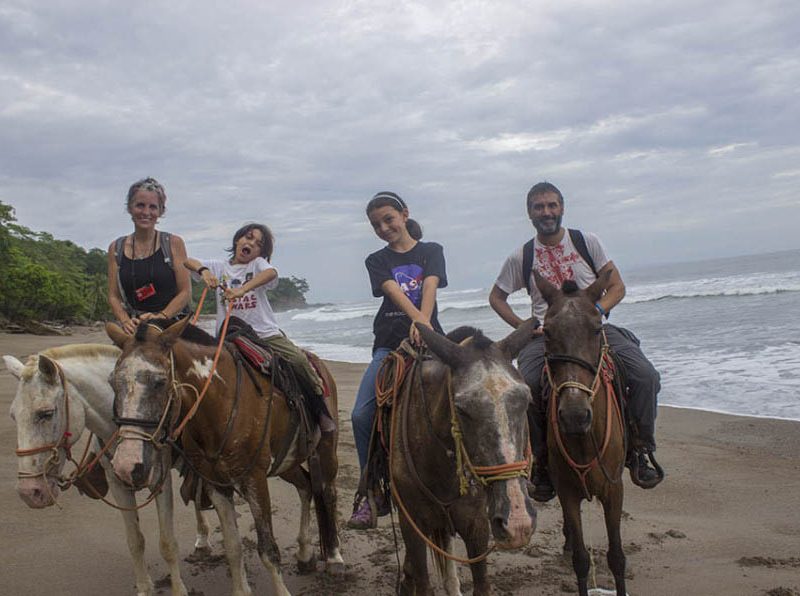
Make Money and Travel – Teach English in South Korea
Chelsea and Jeremy just returned to the states after 3 years of living in South Korea teaching English. They made good money, traveled to lots of new countries and have decided to share their Make Money and Travel story with us.
This adventurous couple saved up enough money over seas to return home, renovate a 30ft RV and should be hitting the road any day now!
How they ended up in Korea is very similar as to why a lot of us get started with full time travel. Chelsea and Jeremy were terrified of the idea of settling down after getting married, “you know, house, car, and little things running around in diapers”. They have what we call a case of Sedentary Lifeaphobia.
So, they packed it all up and moved to the island of Geoje, South Korea to teach English. This is where you may want to go grab yourself a beverage and settle in for another adventure in how to make money and travel!
The Job(s)
Describe your working situation and what line of work you’re in.
Have you always had this job? At what point did you realize that you could bring in enough income to continually fund a location independent lifestyle?
My husband and I are both Business English teachers in Korea. Trust me, this is not what our previous training is in and we never thought that we would be teachers, especially in a different country. My husband graduated with a degree in Aviation Science and I graduated in Fashion Marketing and Merchandising. Just about as far from English teachers as you can get. But that didn’t stop us. Shortly after getting married we decided the conventional life was not for us and we looked for opportunities to travel while we didn’t have anything tying us down to one location.
We left just four months after tying the knot and didn’t look back. My husband’s old roommate got us a job at his old school teaching 5-15 year olds basic English. We then moved on to teach adults at a large shipbuilding company. While both jobs were excellent and funded our travels, we definitely enjoyed teaching adults more. Each person is different and one job is not necessarily better than another, it’s all about finding something that you enjoy doing.
After the first year we realized that we had a whole lot more traveling we wanted to do and the jobs we had paid us more than enough to do so. In all, we taught in Korea for three years and were able to visit 10 different countries while still saving money. And now we’re using some of that savings to do more traveling. But this time we’re traveling in a 30 foot Class A RV and spending the next six months traveling the entire west coast.
The Hours
How many hours do you put in a week and what does a typical workday look like for you?
This can range so dramatically depending on which job you get. When we first started teaching in Korea, we would get to work, make lesson plans then spend the next 6-9 hours teaching ages ranging from 4-15. An average week we spent about 40 hours a week at work. Each year we were there, we worked less and less. The last year we were in Korea, we worked about 20 hours a week working and maybe an extra hour or two doing planning/administration work. An average day our last year was vastly different since we were teaching adults and we would teach a total of 5 hours a day Monday-Thursday and were only at work when we were actively teaching one of our Business English classes.
The Pay
What is the average salary for someone in your line of work? How long did it take for you to start earning a comfortable/typical living? Are you scraping by or are you able to put money in savings and pay your bills?
Our first year teaching we were making an average of $2,000 a month. But our housing was paid for, half of our insurance was covered, and our plane tickets both to and from Korea were supplied. We were able to travel as much as we wanted and still put some cash in the bank. The next two years we kept hitting the pavement in search of a better job, which had less hours and more pay. Which is completely possible to find in Korea, as the opportunities are abundant if you look hard enough. Each year we were able to improve our living conditions, increase our income, work less hours and not only travel more but also put more in the bank as savings each year.
The Tools
What are the most essential pieces of equipment, education or programs you need?
Korea is different than most other countries in which you can teach English as of right now, you do not need any extra education past a Bachelor’s degree such as a TESOL certification. So as long as you graduated with a Bachelor’s degree and are from one of the seven countries (USA, Canada, South Africa, Australia, New Zealand, UK, and Ireland), which are eligible to teach in Korea, you can teach!
Of course you’ll need to have a passport to get over to Korea.
What about a work visa?
Thankfully your employer helps you with this step! There is still a ton of paperwork on your end but they are a huge help in letting you know the process and help with whatever they can on their end.
Do you need a car?
If you are located in one of the larger cities in South Korea, a car is not necessary. Their transit system is one of the best and most reliable I have ever encountered in another country. However, if you prefer having your own set of wheels or just like the convenience, both cars and motorbikes are great options. Since we were in a smaller town we purchased two (very small!) cars and it worked great for us. We got an international drivers license from AAA but that was only valid for a year. If you are planning to stay longer than that I would recommend getting a Korean driver’s license. For American’s it’s an easy process of going to the embassy and swapping your American license for a Korean one.
The Client
Who are your clients? Do you find them or do they find you and how?
It’s amazing what doors open after living in Korea. The foreign community is fairly small and word of mouth regarding jobs and opportunities tends to spread quickly. Each of the three years we were there we taught at different jobs and were able to find new jobs that paid more and had us work less. Between the both of us, we ended up working at several after school academies, a kindergarten, a high school and a large corporation by the end of our stay.
Do you have any resources for job placement?
There are a ton of great, reputable recruiters that you can go through including EPIC which handles all of the public school placements.
The Up’s
What are the most positive things about working while traveling? Those things that make you think wow; I really am living the dream.
The freedom is undeniable. Being free from the conventional life, being free from financial burden, being free to travel the world around us, and being free from jobs that we dreaded going to each morning. While working in Korea we were literally able to live the life that we had envisioned for ourselves all while saving money for our future dreams.
The Down’s
What are the most frustrating things about working while traveling? Any ways you’ve found to avoid or cope with this frustration?
Of course, living in another country and a completely different culture can have a plethora of negatives attached to it as well. The work culture is definitely a lot different than what we were used to in the states. Sick days are highly looked down upon so we often worked through a variety of illnesses and last minute details are a way of life and changing the entire schedule is to be expected at one point or another. But through it all, a positive attitude and understanding make all the difference in the world and will keep you sane.
Hindsight
If you could go back in time and give yourself advice about starting in this line of work, what would it be?
Making the transition overseas, to a different culture, and a different language can be more than difficult as I’m sure you can imagine. But there are so many ways to make it easier.
Give yourself time. It’s not going to feel like home right away. Which is a real expat buzzkill. I always told new teachers in town to give it at least three months before making any moving decisions. Because trust me, in those first three months I can almost guarantee that leaving will cross your mind at least once. I know that it crossed my mind more than once as we sat in the Love Motel (rent by the night…or by the hour. Real classy) for the first two weeks of our time in Korea because our apartment wasn’t ready yet. Or on my first day of school when I cried in my classroom because I felt so overwhelmed with 9 five year olds in front of me that did not know one word of English. But after three months I finally began to know my way around town, it didn’t take quite as long to pick out food in the grocery store, and work began to go more smoothly. Everyone is different with how they adjust but understand that it’s rarely going to click right away.
Laugh it off. You have to be able to laugh at yourself. There will be times when the cultural differences in everyday life and in work life will seem like too much to handle. Like, I don’t know, when you have to play charades in order to find the lady doctor (seriously…someone find me a rock to hide under) or when random creepy guys come into your classroom to take a picture of you, or the older woman behind you elbows you in the ribs and cuts ahead of you in line. But if you develop a good sense of humor and the ability to laugh it off, it will be much more enjoyable.
Have patience. Patience is not a virtue I particularly excel at. But when you’re teaching young children a language they do not yet know and you have to explain what to do three times, in three distinctly different ways…patience eventually becomes one of your strong skills. Not to mention, as an expat living in a country where I know very little of the language I need to remind myself to be extra patient as I try to describe what I want or need in a store because after all, I’m the one that should be able to speak their language.
The Fantasy Job
What is one of the most creative ways you’ve heard of someone funding a location independent lifestyle? The one that made you wish you had thought of it first!
Ya know, I’m pretty happy with the way we’ve been traveling actually! But if I were to pick a dream job, it would be working with my degree in fashion for a humanitarian based company. And if I were able to also travel with that company, it would be a huge plus!













Rami
Great idea, though. I’m traveling in Thailand more 4 years and if I can add an extra income of 2k USD a month it’ll be absolutely helpful for me and my wife. The only problem is that in most of the country you are not allowed to work. But, I am definitely going to check this and give it a try. Thanks a lot for the Inspiration
Lynda Gatlor
I should like to know if it is necessary to have a bachelors degree? I am a retired nurse and would love to go there to teach English?
tim
Nice story.
I’m a little confused that you were only making 2k USD a month!
I’ve had several friends go there and teach. They pull at least 80k to 100k USD / year and that’s net.
One friend came back after 4 years with over 280k USD cash.
He spent so much money partying like a fool he said he was stupid and felt really dumb.
Another friend is now a millionaire, he married a Korean girl to open his own business.
Jason Wynn
Interesting info Tim, thanks for sharing.
Nita
Hi Tim, can you ask your friends what agency did they go through to find these jobs?
karin@yumandmore
Wow 3 years is a long time when you are young! It shows true dedication and also a great ability to realize the goal one is working towards. Very admirable. An interesting and inspiring story. Good luck to Chelsea and Jeremy sounds to me they will succeed in anything they aim for.
Nikki Wynn
Right, dedication indeed! I am looking forward to following their journeys wherever they may go.
Steve
I would love to be able to do what they did. Chelsea said she spoke little Korean. How can that work? Warf could teach me Klingon because he is fluent in English. I don’t understand how it could work otherwise. I know it did work, but I don’t understand. Anyway, if I could have any life style. it would be like yours and Jason’s. Either way would require a great deal of mutual support. Y’all’s interactions are why we love you guys. Thanks for sharing.
Nikki Wynn
I agree Steve, it’s hard to imagine teaching someone a language if you don’t speak theirs. But obviously they make it work somehow…now wouldn’t that make for an interesting video!
Glenda White
I have a former student who teaches in Korea. She loves her job and the people there. She travels all the time and is living an adventure. While I am extremely proud of her, I’m also secretly jealous!
Nikki Wynn
Well Glenda, sounds like you are well qualified and have a great reference…you could always join her!
Nita
Ms. White can you find out what agency she went through??